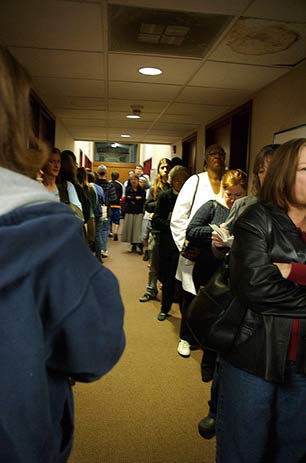Honest, paywall-free news is rare. Please support our boldly independent journalism with a donation of any size.
Another legislative session, another unfortunate attempt by Texas politicians to make it harder to vote. While other states move their registration systems into the 21st century — by putting the onus on the government to add eligible voters to the rolls, or letting citizens sign up online, for example — Texas maintains its sad tradition of disenfranchisement.
One measure (HB 1096) that would make it more difficult for voters to confirm their residency recently cleared the House. Another bill approved by the Senate (SB 1934) would eliminate nonexpiring photo identification cards for the state’s senior citizens. Because unexpired photo IDs or IDs that have been expired no more than 60 days are required to vote, this change would make it even harder for Texas seniors to get their ballots counted. Do we really need to wonder why lawmakers are making these changes?
While some legislators have introduced bills this session to help voters, these bills have largely gone nowhere. A bill that would issue no-charge birth certificate copies to some Texans under a limited set of circumstances passed the Senate, but the law, if passed, would help only a fraction of disenfranchised voters. This is not enough. Texas deserves a Legislature that will take action to ensure that the voices of all eligible voters are heard, rather than putting up more obstacles to the ballot box.
In 2011, Texas enacted the nation’s strictest voter ID law. It permits use of limited types of photo IDs to vote, and the ID must be current or recently expired. To obtain nearly every form of acceptable ID, an original or certified copy of a voter’s birth certificate is required. Hundreds of thousands of registered Texas voters lack the ID or supporting documents needed to meet these stringent requirements.
While Texans of all ages have felt the negative impact of the photo ID law, the burden on the state’s seniors is particularly acute. Older voters are less likely to have a current driver’s license — because many no longer drive — and are more likely to find it difficult or downright impossible to obtain a birth certificate. Many live in long-term care facilities and, because of health or liability issues, are unable to travel to renew their IDs, or are understandably overwhelmed by the required paperwork. Cutting nonexpiring state IDs for seniors would only exacerbate these burdens.
So far, two federal courts have stepped in to block the Texas ID law because it disenfranchises Latino and African-American voters. Last year, a federal court in Texas found the law not only had the effect of discriminating against minority voters but also that the Legislature passed the law with the intent of making it harder for voters of color to cast a ballot. The case is now before a federal appellate court. During oral arguments, a Republican-appointed judge pointedly asked Texas’ attorney why the Legislature hasn’t taken the opportunity to fix the problems with the photo ID law. The lawyer had no response when the judge asked why it should fall to the court to fix the law, when legislators have had years to do so.
The numbers show that some legislators have had ample opportunity to help voters. This legislative session alone, there have been at least 17 bills introduced to ameliorate the strict voter ID law. Bills that would allow expired government-issued IDs to be accepted for voting and others that would expand the list of acceptable IDs have not gotten so much as a public hearing. The Legislature has instead chosen to expend more energy on changes that would make voting even more difficult.
Bills to soften the draconian photo ID law are not the only voter-friendly measures Texas legislators have left on the table. At least 28 other bills have been introduced that would expand access to the ballot. These efforts range from proposals that would make it easier for voters to update their registration to legislation that would increase language access for voters whose primary language is not English. Nearly all of these bills have received no legislative attention.
While a proposal that would have allowed Texans to register through a secure online portal did manage to at least get a public hearing, legislators expressed skepticism that the modernizing reform — which has been successfully adopted by nearly 30 other states — could be done in Texas. They promptly killed the bill.
Given Texas’ sordid history of manipulating the right to vote, perhaps it shouldn’t be surprising that the Legislature is making voting harder. Texans should demand better.
Press freedom is under attack
As Trump cracks down on political speech, independent media is increasingly necessary.
Truthout produces reporting you won’t see in the mainstream: journalism from the frontlines of global conflict, interviews with grassroots movement leaders, high-quality legal analysis and more.
Our work is possible thanks to reader support. Help Truthout catalyze change and social justice — make a tax-deductible monthly or one-time donation today.
